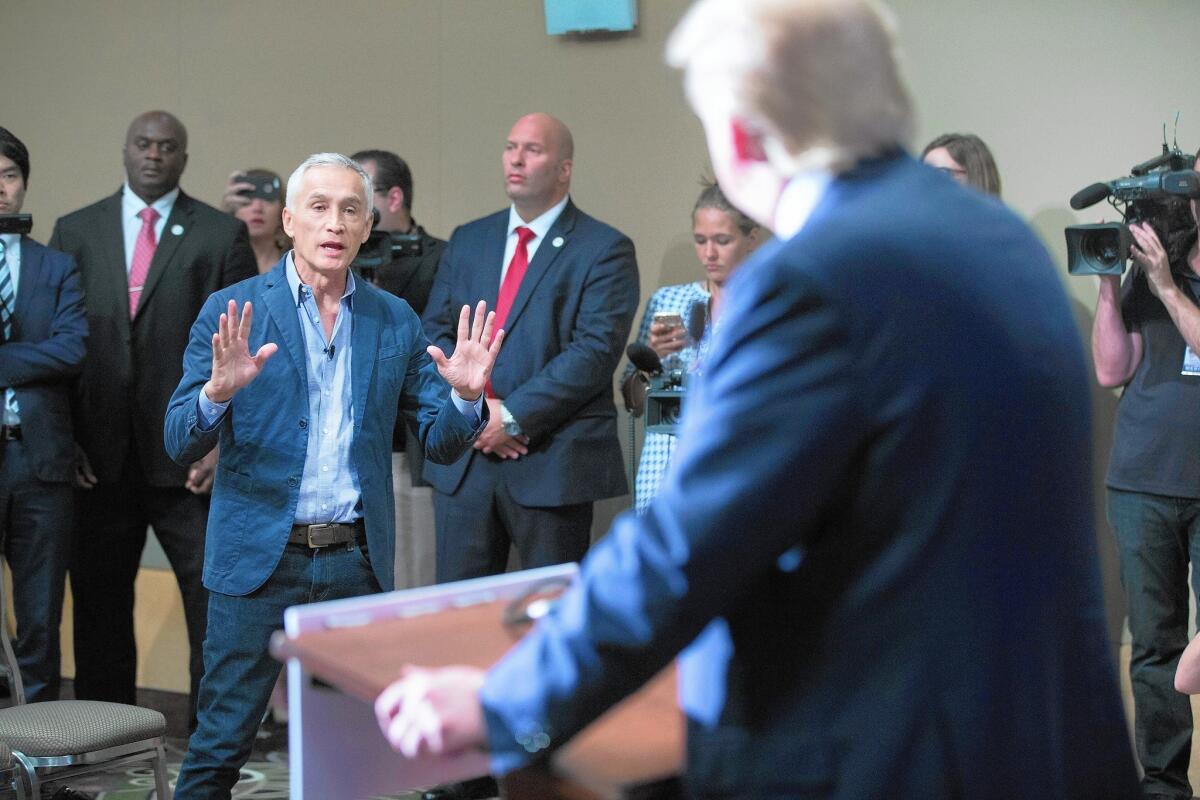Univision’s Jorge Ramos’ confrontation with Trump over immigration is a case of deja vu

Reporting from New York — Every four years, the English-speaking TV world rediscovers Jorge Ramos.
The video of the Univision news anchor being escorted out of Republican presidential front-runner Donald Trump’s news conference went into heavy rotation on Wednesday news programs. Ramos did several TV interviews after noting that he had not been subjected to such treatment even in Cuba and Venezuela.
But Ramos has made headlines during presidential campaign seasons before by aggressively challenging candidates on the issue of immigration reform.
SIGN UP for the free Essential Arts & Culture newsletter >>
“It’s in character for him to take such a provocative stance,” said Marisa Abrajano, an associate professor of political science at UC San Diego who has written about Spanish-language media. “He’s always been the one to stand up to politicians and basically call them out. This is very consistent with his behavior in the past.”
Ramos confronted President Obama in 2012 about his failure to deliver on a promise to enact immigration reform in his first term. He made Obama’s Republican opponent, Gov. Mitt Romney, squirm as well after pressing him on his plan for deportation of undocumented immigrants. “He wanted the Hispanic vote and at the same time he was promoting deportation,” Ramos said in a 2013 interview. “It was like he was saying ‘Vote for me, but I don’t want you in this country.’’’
Ramos pushes candidates on the issue because he believes that Latino voters are largely ignored until campaign time rolls around.
“I call it the Christopher Columbus syndrome,” he said after the 2012 campaign. “They rediscover us every four years.”
The importance of Ramos to the Latino audience may have dawned on Trump. After having him ejected from the news conference, Trump invited Ramos back into the room and allowed him to ask several questions about the candidate’s controversial proposals that include the deportation of 11 million undocumented immigrants.
But the image of Trump telling Ramos to “go back to Univision” before he was ejected is a scene Latino voters are unlikely to forget.
Angelica Salas, director of the Coalition for Humane Immigrant Rights Los Angeles, said she thinks Trump’s dismissal of Ramos had racial overtones. By ejecting him from the news conference, Trump was telling Ramos, “I’m going to put you in your place,” Salas said.
She said many Latinos are in shock at the disrespect shown to Ramos.
“He’s one of the most trusted figures in our community,” she said. “You don’t know how many people saw this last night. It was painful. It’s what we fight about when we’re talking about equality. We’re fighting for respect.”
Ramos, 57, has been called the Walter Cronkite of Spanish-language television. His Univision broadcast, “Noticiero Univision,” which he co-anchors with Maria Elena Salinas, is watched by an average of 2 million viewers a night. That represents a much larger audience than what CNN’s Wolf Blitzer pulls in the hour.
The Mexican-born Ramos has been the dominant figure in Spanish-language TV news since he joined Univision in 1986. The network’s ratings success with telenovelas imported from Mexico has spilled over to his program in the last 30 years.
But he’s chosen to use his platform as an advocate for immigration reform, which separates him from traditional TV news anchors.
“I think he sees himself as a voice and someone who can get attention and get answers to certain key questions,” said Joe Peyronnin, a former news executive for Univision’s competitor, Telemundo.
Peyronnin added that Ramos’ independence and fearlessness date back to his work as a TV journalist in Mexico.
“When he worked in Mexico, he quit because his bosses tried to dictate to him what he should say and not say about the government,” Peyronnin said.
But not everyone in the Latino community approves of Ramos’ approach.
“You don’t have advocates credentialed at news conferences,” said Ken Oliver-Mendez, director of MRC Latino, a conservative group that monitors Spanish-language news. “Reporters have the right to ask questions at press conferences, but activists and advocates don’t. It’s a whole other field of activity. Jorge should either work in one field or the other. Mixing the two is not correct.”
Twitter: @SteveBattaglio, @katelinthicumom
MORE:
How Donald Trump turned the immigration debate from reform to ‘anchor babies’
Donald Trump and Univision’s Jorge Ramos engage in testy exchange in Iowa
GOP strategist talks to Trump supporters and comes away believing he could win the nomination
More to Read
From the Oscars to the Emmys.
Get the Envelope newsletter for exclusive awards season coverage, behind-the-scenes stories from the Envelope podcast and columnist Glenn Whipp’s must-read analysis.
You may occasionally receive promotional content from the Los Angeles Times.










